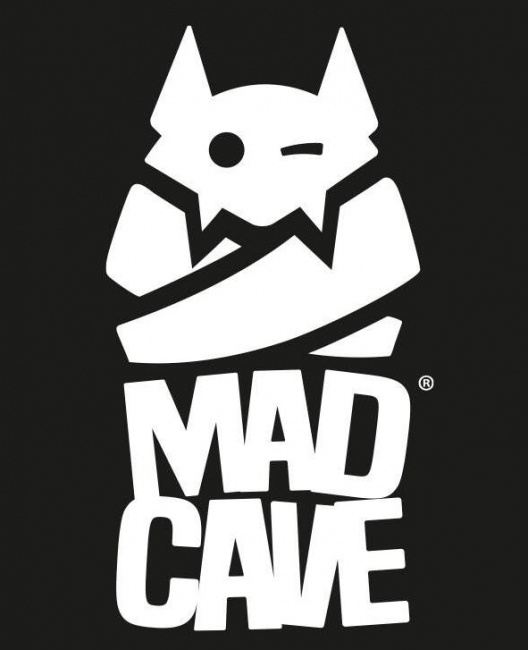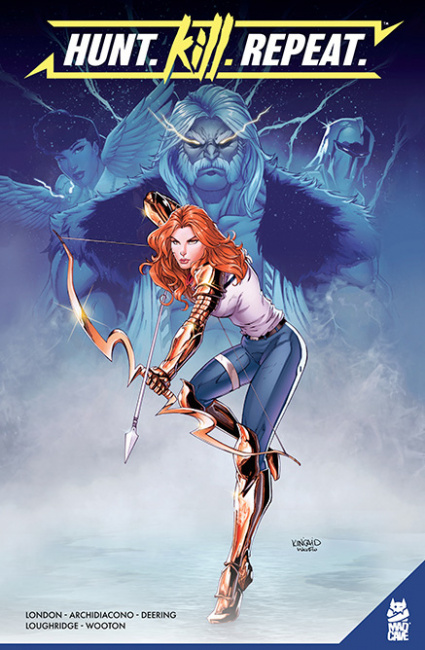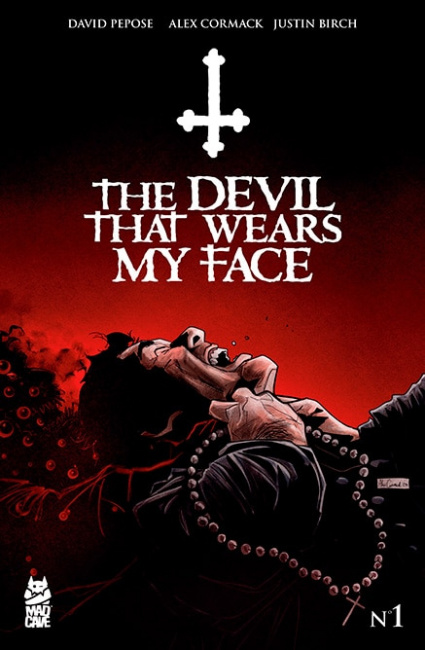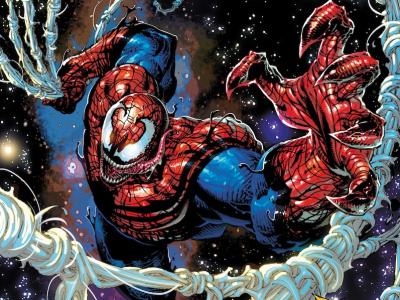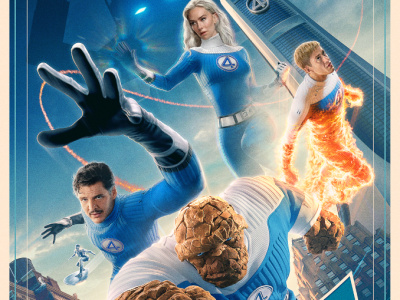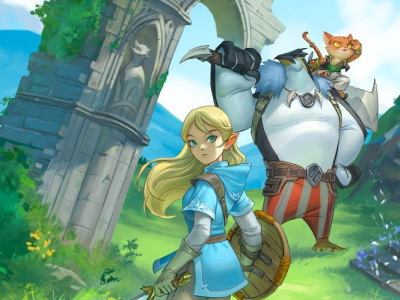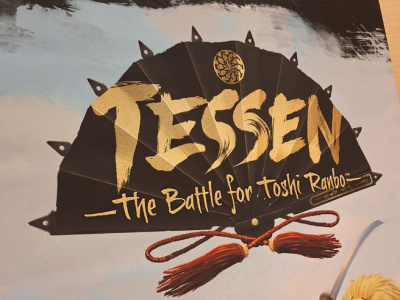We caught up with Mad Cave Studios Publisher Chris Fernandez and Vice President – Business Development at San Diego Comic-Con to ask them about Mad Cave’s expansion, especially into licensed books, the top titles, current and upcoming, in the Mad Cave line, and the opportunity for growth in the Direct Market.
ICv2: Mad Cave has added a bunch of licensed properties over the last few weeks and months: some kid, some adult, TV, Japanese, so a real eclectic mix. What's your strategy with regard to licensed titles? Why are you expanding into that area?
Mark Irwin: Over the last couple of years, Mad Cave has talked about growth, just general overall growth. That growth has included creator‑owned and licensing. When we took a look at licensing, we've always decided to not over‑license but to be strategic within our licensing. We wanted licenses that made sense for our middle‑grade imprint, for our YA imprint, and for our adult imprint. We looked at stuff that had nostalgic value as well as stuff that had growth value. That's been pretty much our philosophy for all of our books, but it really applies to licensing.
We think with titles like Flash Gordon, with titles like Gatchaman, with titles like Miraculous (Ladybug) and Geronimo Stilton and The Smurfs and Asterix, all of…
Some of those were Papercutz licenses that you brought over?
Irwin: Some of those were Papercutz that we elected to continue and not lapse. There's a thought process to building those IPs and building Mad Cave alongside them. We definitely have a reason for doing the things that we do.
So the mix changed between originals and licensed. Why did you change the mix? Do you see that changing going forward or staying the same?
Irwin: I think our mix has always been one‑third of each, licensing, originals, and creator‑owned. That's always been our goal at least. Over the last couple years, that's been our growth goal.
What's the difference between originals and creator‑owned?
Irwin: The big difference there is that what we call originals are what we create and develop in‑house. Then we hire work‑for‑hire talent to work on those things. Creator‑owned are outside creators that we talk to, that bring their IPs to us. We do a creator‑owned deal with them to publish those titles.
How is the overall publishing output of Mad Cave going to change as a result of all these new licenses, or is it?
Chris Fernandez: It's similar to what Mark was saying about the one‑third of each, about every month. Next year, for example, you're going to see a strong influx of strong creator‑owned titles to start out the year. We're never going to lose focus on our originals.
One of the benefits of working with creator‑owned titles now is that it keeps us to the standard that we need to be with our own originals. You're going to see a lot of really strong new titles on par with the stuff that came out this year, for next year.
Beyond that, you're going to start seeing stuff early spring for titles like Gatchaman, Miraculous Ladybug.
What's the percentage change in your releases for 2024 versus 2023?
Fernandez: If we're looking across all three imprints, we're looking at about a third of the releases every month are going to be Papercutz titles, which mostly are all licensed titles.
Maverick, we're going to be looking at one monthly release. That's more of a boutique‑style imprint. It's not three to four books a month; it's one a month. It's going to get its own spotlight.
Beyond that, in the Mad Cave side of things, there's a further split between creator‑owned, licensed, and originals that we're going to develop internally. Our current output right now is anywhere between six to eight Mad Cave titles, single issues, a month, trade paperbacks.
Next year, we're going to increase that about 50 percent, starting in about February, March, to 10 to 12, sometimes a little bit more, in some cases.
The Papercutz output is going to remain pretty standard throughout. We're going to be introducing some new titles that we've already announced, starting in late winter this year. There's a lot more stuff, actually. I think by this time next year, I'm going to have some bigger numbers for you.
What's your book distribution?
Irwin: Simon & Schuster is our master distributor, but we distribute through Diamond and Lunar on the direct market side.
Mad Cave is expanding rapidly; what's the source of Mad Cave's financing?
Irwin: Mr. London.
It's personally financed, in other words? Privately financed?
Irwin: Yeah, Mark and his wife have been successful in other industries. They've continued to bring that success. Mad Cave was started basically as a vanity imprint, in many ways, for Mark's desire to write his own comics.
He loves the industry. He loves comics and just always wanted to create his own. He started the company to publish those. They had some minor success. He saw a way to keep building those ideas and getting those ideas out. He brought in Chris. There was just a lot of growth. Then they brought me in. I went nuts and made that even bigger.
What are your current bestsellers in periodical or book format?
Fernandez: The number one we can always point to is our Nottingham series. It's currently on its third volume, the third being an anthology, with the third proper volume in production now. That's guaranteed.
This year has actually seen a lot of new success for two creator‑owned titles and one internally, one of them, the first one, being Hunt. Kill. Repeat., which is by Mark London. I actually worked on that book editorially.
Very fun series. My quick pitch for that is Kill Bill meets Clash of the Titans. That's seen a lot of success, with the action, with the Direct Market. It's a very action‑oriented title.
The other two are creator‑owned titles. The first one is Don't Spit in the Wind, which is our first creator‑owned title that we released. It's all done by Stefano Cardoselli. Interesting, four‑issue miniseries with wild art.
The other is also a four‑issue mini, by Curt Pires and Kevin Castaniero, called You've Been Cancelled. If you guys are familiar with that book, all you've got to do is crack open a page, and you're hooked. The art is kinetic. It's frantic. Running Man, full of satire. It's a great book. I can't wait to see more from those guys, from both those guys, actually.
Between now and the end of the year, any launches that you're particularly excited about?
Fernandez: The Devil That Wears My Face is a new horror series coming out, by David Pepose and Alex Cormack, in October. I've been super‑impressed with Alex Cormack's artwork for years. This is the first time I got to work with him. David Pepose is somebody that I've been reading for a long time as well and have seen his success on Marvel titles.
When that was announced at the retailer summit, it got a massive pop from the audience. It's been seeing a lot of early success from retailers when our team is talking about the book and getting variant covers done for stores. I think that's our next really big hit that the market is going to be talking about.
What's your evaluation of the current state of the comics market, Direct and book?
Irwin: For us as a whole, we try to look at ourselves as a publisher and not a comics publisher necessarily, a publisher that specializes in graphic storytelling.
We look at the Direct Market as something that we want to excel at. We want comics retailers to grow. We want there to be growth in that market, but we also recognize that there's some limitations to that market right now.
We look at the book market as our ally in growth. What we hope is that as time progresses, that the comics Direct Market shows a little more openness to middle‑grade and YA content and is willing to grow in that direction.
We certainly think the support systems are there for them to grow in that direction, but we recognize that it's very hard. It's very hard. It's a hard market right now. We have competition releasing hundreds of titles a month, hundreds of titles a week.
In kids titles versus adult, or are you seeing that level of competition across the board?
Irwin: That competition does go across the board for middle‑grade and YA. There's a tremendous amount of great YA content out there and a tremendous amount of middle‑grade content out there that really is being sold primarily in bookstores and not in the Direct Market.
I grew up in comic shops. I know what they were like when I was a kid. I know that they were a haven to me, but kids today are looking for things that are a little different than what we grew up with in the typical comic shop. They're looking to their phones and to their tablets as a new place to find the content that made us go, "Yeah [laughs], exactly."
There's so much room for growth across the spectrum in this market. The reality is that comics are the greatest medium, period, of any storytelling content, in my opinion. Every story, no matter how boring [laughs] or bland, can be told with a comic book. The key is finding ways to deliver it to the audience. We're doing things like curriculum programs for middle‑grade content.
How Scholastic of you. [laughter]
Irwin: It is Scholastic of us. You have to find ways to get kids excited about this content and find ways to give them the content that they want, that they're excited about reading. We're always looking for ways to explore that.
You mentioned limitations to the Direct Market and that the book channel was an ally for growth. What are those limitations, the willingness to carry middle‑grade and YA titles?
Some of it's willingness. I also think it's really just a matter of simple economics. If I'm running a small comic book brick‑and‑mortar and I have to bring in 15 Batman titles and five Spider‑Man titles, at a certain point my wallet can only go so far. I totally understand that.
You have to bring in what your customers are currently buying. It's very difficult to say, "I know you're my customer base, but I want to get more customers. Now I have to find ways to bring in those people."
The moms are already in the bookstores, right?
Irwin: Yeah. We're already there. It is difficult. If any of us knew how to solve that problem, it would have been solved.
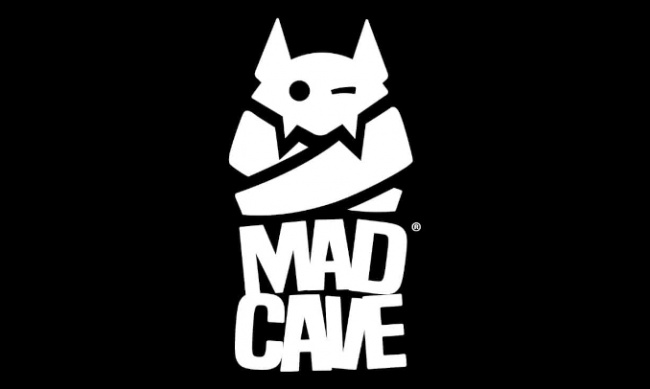
On License Expansion, Mad Cave's Top Titles, and Direct Market Opportunities
Posted by Milton Griepp on August 8, 2023 @ 3:32 am CT
MORE COMICS
'Venom' #252 to Feature Backup Story with New Suit, Plus New Story by DeFalco and Frenz
August 4, 2025
Venom #252 will feature a backup story about Venom’s new suit as well as a backup story by Tom DeFalco and Ron Frenz, the creators of the symbiote suit.
Showbiz Round-Up
August 4, 2025
The post-SDCC showbiz news is still spicy a week after the show's conclusion. It's time for another round-up!
MORE NEWS
New Anime-Style RPG by Two Little Mice
August 4, 2025
Free League Publishing announced Twilight Sword RPG , a new RPG by Two Little Mice.
'Tessen: The Battle for Toshi Ranbo'
August 4, 2025
Office Dog previewed Tessen: The Battle for Toshi Ranbo, an Legend of the Five Rings board game.



